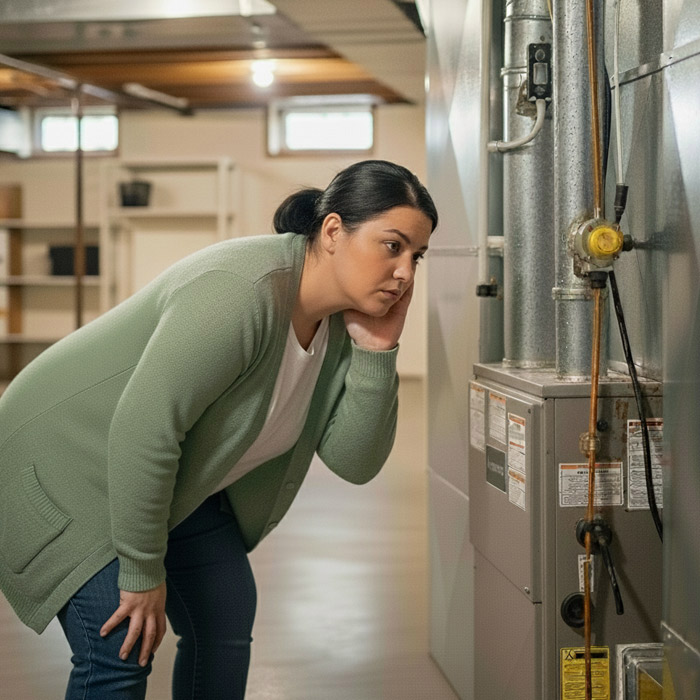
Your home's heating system is a quiet workhorse. You may hear some noises that are just part of its regular function, but new sounds can be jarring and may be signs of a problem that needs attention.
Normal vs. Problematic Heater Noises
Every heating system produces some level of sound during operation. The gentle whoosh of air moving through vents, a quiet hum from the blower motor, or the soft click when the thermostat engages are all typical sounds. These noises indicate that components are working as designed. However, loud or unusual sounds deserve attention. Learning to distinguish between acceptable operational noise and concerning sounds helps homeowners respond appropriately.
A heating system that suddenly becomes louder than usual may be signaling trouble. Changes in sound patterns often precede mechanical failures. Sharp, repetitive noises differ significantly from the steady background hum of a healthy system. Paying attention to these auditory cues can save money and prevent uncomfortable breakdowns during cold weather.
These alarming noises often startle homeowners awake at night. Several issues can cause such disruptive sounds. In forced-air systems, expanding metal ducts produce loud bangs as they heat up and cool down. This phenomenon, called oil-canning, happens when ductwork wasn't installed with enough room for thermal expansion. While annoying, it's generally harmless.
More serious causes include delayed ignition in gas furnaces. When the burner doesn't light immediately, gas builds up before igniting all at once. This creates a small explosion inside the combustion chamber. The resulting bang indicates a dangerous situation that requires immediate attention. Dirty burners or a faulty ignition system typically cause this problem.
Loose or broken components also create banging sounds. Blower wheels that have come loose, cracked heat exchangers, or detached panels rattle around during operation. These situations need prompt repair to prevent further damage. A damaged heat exchanger poses serious safety risks, including carbon monoxide leaks.
High-pitched squeals make everyone cringe. These sounds usually point to problems with the blower motor or belt. Worn belts slip against the pulley, creating a screech that intensifies as the system runs. Replacing the belt typically resolves the issue. Some systems use direct-drive motors without belts, but these can still squeal when bearings wear out.
Blower motor bearings need lubrication to function smoothly. When they dry out, metal grinds against metal, producing a sharp screech. This situation damages the motor if left unaddressed. Some motors have sealed bearings that can't be lubricated. These require replacement when they fail.
Lack of maintenance accelerates wear on moving parts. Dirty air filters restrict airflow, forcing the blower motor to work harder. This extra strain wears out bearings faster and can cause belts to slip. Regular filter changes prevent many squealing problems.
A whistling heater often indicates airflow restrictions or leaks. Dirty air filters are frequent culprits. When filters become clogged with dust and debris, air struggles to pass through. This restriction creates a whistling sound as air forces its way through small gaps. Replacing the filter usually stops the noise.
Leaky ductwork also produces whistling sounds. Small holes or gaps allow air to escape under pressure. The rushing air creates a whistle similar to wind blowing through a crack. Sealing duct leaks improves efficiency and eliminates the noise.
Hissing sounds in gas furnaces might signal a gas leak. This serious safety hazard requires immediate action. Turn off the gas supply and leave the house if you smell gas or hear persistent hissing near the gas line. Call the gas company and a heating technician right away.
Refrigerant leaks in heat pumps also produce hissing sounds. Low refrigerant levels reduce heating capacity and can damage the compressor. A qualified technician should locate and repair the leak, then recharge the system.
Rattling noises often stem from loose parts. Screws, bolts, and panels vibrate loose over time due to regular operation. Access panels that aren't secured properly rattle against the unit's frame. Tightening these fasteners stops the noise.
Objects lodged in ductwork or vents create rattling sounds as air flows past them. Children sometimes drop toys or other items into floor registers. These objects bounce around inside ducts when the system runs. Removing the obstruction solves the problem.
Rumbling sounds from gas furnaces suggest burner issues. Dirty burners accumulate soot and debris that disrupts the flame pattern. Instead of burning cleanly, the flame becomes irregular and loud. This inefficient combustion wastes energy and produces excess carbon monoxide. Professional cleaning restores proper operation.
A rumbling sound that continues after the burner shuts off might indicate a cracked heat exchanger. This serious issue allows combustion gases to mix with household air. Heat exchangers crack due to age, corrosion, or thermal stress. Replacement is usually the only option.
Popping sounds from ductwork are similar to the banging described earlier. Metal expands when heated and contracts when cooled. This movement creates popping noises. While irritating, these sounds don't indicate a mechanical problem. Adding more return air vents or resizing ducts can reduce the noise.
Boiling or bubbling sounds suggest water problems. Steam radiators and hydronic systems sometimes develop air pockets that cause gurgling noises. Bleeding the radiators can release trapped air and stop the sound. Low water levels in boilers can also create boiling sounds as water overheats.
Sediment buildup in water heaters or boilers produces popping sounds. Minerals settle at the bottom of the tank and harden. When water heats beneath this layer, steam bubbles form and pop as they rise through the sediment. Flushing the tank removes these deposits. Ignoring sediment buildup reduces efficiency and shortens equipment life.
Gentle clicking when the heater starts and stops is normal. The thermostat relay clicks as it signals the system to begin or end a heating cycle. This brief sound indicates proper communication between components.
Repeated clicking without the system starting suggests ignition problems. The igniter attempts to light the burner but fails, creating a constant clicking pattern. Faulty flame sensors, dirty igniters, or gas supply issues cause this symptom. A technician can diagnose and fix the underlying problem.
Tapping sounds from ductwork occur as metal adjusts to temperature changes. Lightweight or improperly secured ducts tap against floor joists or other surfaces. Insulating ducts or adding supports eliminates the noise.
Electrical components produce buzzing or humming sounds. Transformers, contactors, and relays all generate electromagnetic fields that cause vibration. A low-level hum is acceptable, but loud buzzing indicates electrical problems. Loose wiring connections arc and buzz. This dangerous situation can cause fires.
Capacitors that are failing produce loud humming sounds. These components help electric motors start and run efficiently. A bad capacitor makes the motor struggle, creating an intense hum. Replacing the capacitor restores quiet operation.
Blower motors hum when they run. An unusually loud hum suggests the motor is overworking. Dirty filters, blocked vents, or closed registers restrict airflow and strain the motor. Removing these restrictions reduces the noise.
When to Call a Heating Professional
Some situations require immediate professional help. Gas odors, hissing near gas lines, or suspected carbon monoxide leaks demand urgent response. Turn off the system and evacuate the home if you suspect these dangerous conditions.
Persistent loud noises that don't resolve with simple fixes like filter changes deserve attention. Ignoring warning sounds leads to bigger, more expensive problems. Strange smells accompanying unusual sounds often indicate serious issues.
Homeowners can handle basic tasks like changing filters and tightening loose panels. However, anything involving gas lines, electrical components, or refrigerant requires a licensed technician. Annual heater maintenance catch small problems before they become noisy failures.
If the heater struggles to maintain temperature alongside new sounds, something isn't working right. Decreased efficiency combined with unusual noises signals declining performance. A technician can diagnose issues and recommend repairs or replacement.
Older systems that develop new sounds may be nearing the end of their lifespan. Equipment typically lasts fifteen to twenty years with proper care. Frequent repairs on aging systems often cost more than replacement. A professional assessment helps homeowners make informed decisions about repair versus replacement.
Listening to your heater can provide valuable information about its condition. Don't dismiss strange sounds as quirks. Your heating system is communicating its needs through these noises. Responding promptly keeps your home comfortable and your family safe throughout winter.


